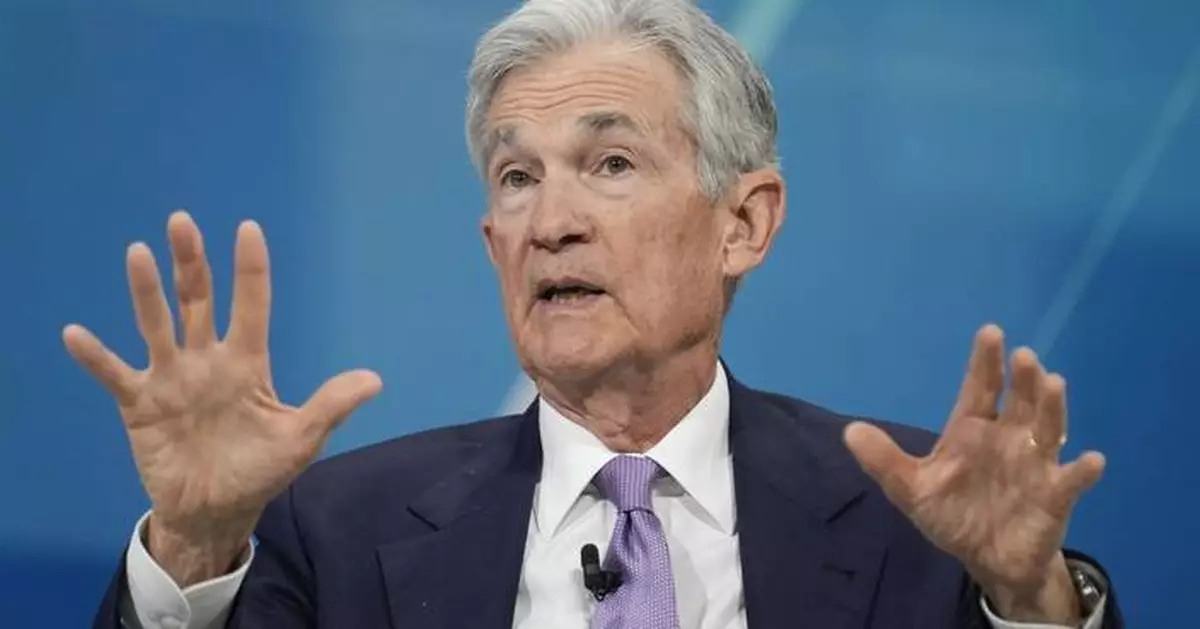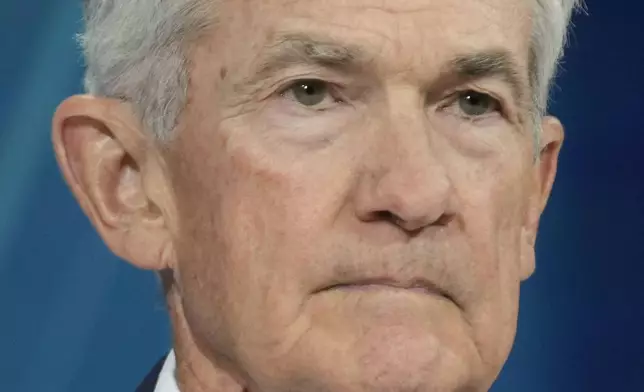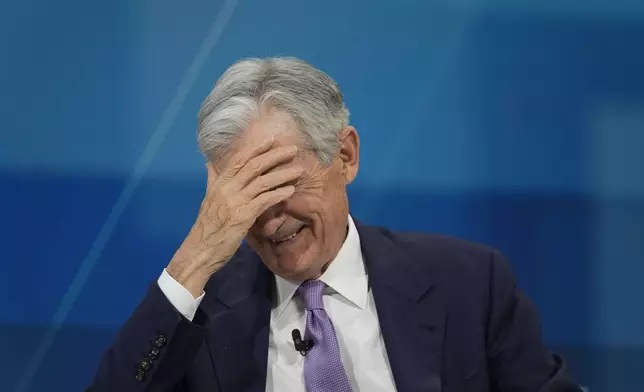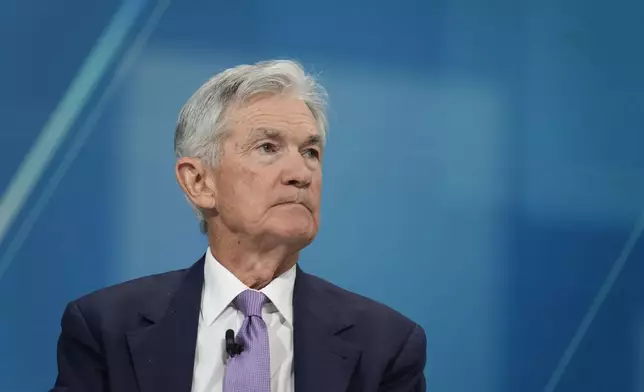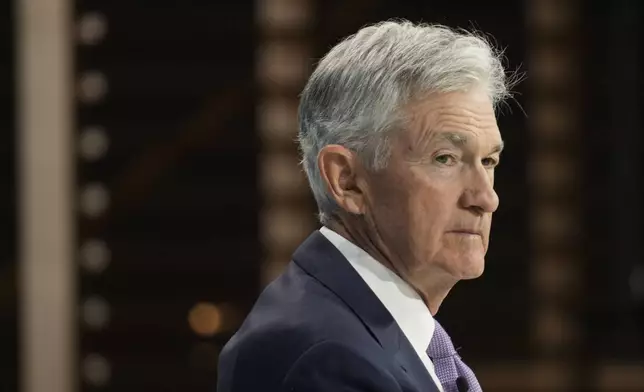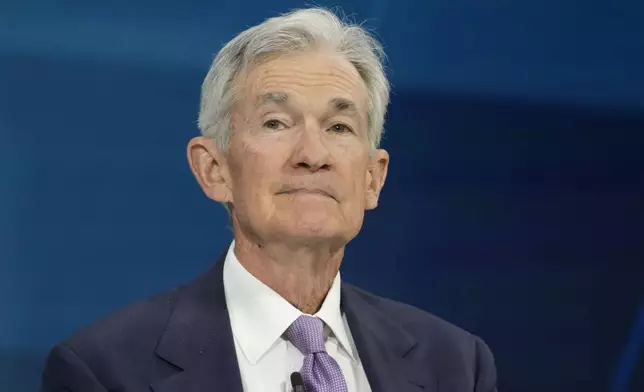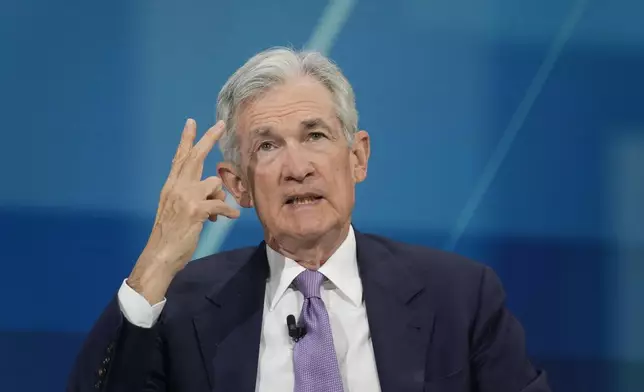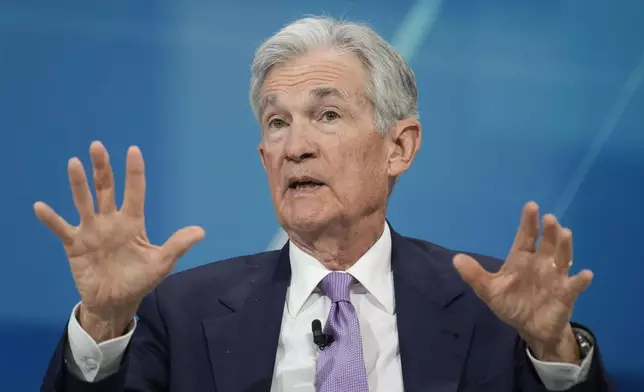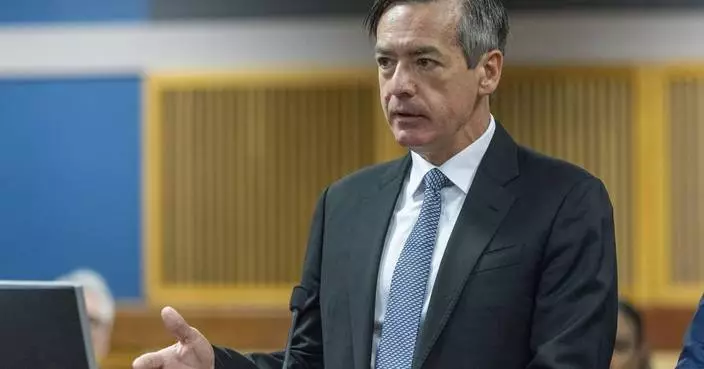WASHINGTON (AP) — Chair Jerome Powell said Wednesday that the Federal Reserve's ability to set interest rates free of political interference is necessary for it to make decisions to serve “all Americans” rather than a political party or political outcome.
Speaking at the New York Times’ DealBook summit, Powell addressed a question about President-elect Donald Trump's numerous public criticisms of the Fed and of Powell himself. During the election campaign, Trump had insisted that as president, he should have a “say” in the Fed's interest rate policies.
Click to Gallery
Federal Reserve chair Jerome Powell speaks at the DealBook Summit in New York, Wednesday, Dec. 4, 2024. (AP Photo/Seth Wenig)
Federal Reserve chair Jerome Powell reacts while speaking at the DealBook Summit in New York, Wednesday, Dec. 4, 2024. (AP Photo/Seth Wenig)
Federal Reserve chair Jerome Powell speaks at the DealBook Summit in New York, Wednesday, Dec. 4, 2024. (AP Photo/Seth Wenig)
Federal Reserve chair Jerome Powell speaks at the DealBook Summit in New York, Wednesday, Dec. 4, 2024. (AP Photo/Seth Wenig)
Federal Reserve chair Jerome Powell speaks at the DealBook Summit in New York, Wednesday, Dec. 4, 2024. (AP Photo/Seth Wenig)
Federal Reserve chair Jerome Powell speaks at the DealBook Summit in New York, Wednesday, Dec. 4, 2024. (AP Photo/Seth Wenig)
Federal Reserve chair Jerome Powell speaks at the DealBook Summit in New York, Wednesday, Dec. 4, 2024. (AP Photo/Seth Wenig)
In his remarks Wednesday, Powell said, “We’re supposed to achieve maximum employment and price stability for the benefit of all Americans and keep out of politics completely."
Despite Trump's comments, the Fed chair said he was confident of widespread support in Congress for maintaining the central bank's independence.
“I’m not concerned," he said, “that there’s some risk that that we would lose our statutory independence. “There’s very, very broad support for that set of ideas in Congress, in both political parties, on both side of the Hill.”
On the topic of interest rates, Powell said the Fed can afford to cut its benchmark rate cautiously, because the economy is doing better than the Fed thought it was in September, when it collectively predicted four rate cuts in 2025 after three cuts in 2024.
“We’re not quite there on inflation, but we’re making progress,” Powell said. “We can afford to be a little more cautious."
The Fed has been aiming to deliver a “soft landing” for the economy, whereby the central bank's interest rate hikes manage to help reduce inflation to its 2% target without causing a recession. History has shown it's a rare and difficult feat.
Yet the economy appears largely on track for such an outcome. The job market has slowed. And inflation is down sharply, though in recent months it has remained stuck modestly above the Fed's target, which could make the policymakers reluctant to cut rates much further.
Several other Fed officials have said this week that they expect to keep reducing rates, without committing to a reduction at their next meeting later this month.
On Monday, Christopher Waller, an influential member of the Fed's Board of Directors, said he was “leaning” toward a rate cut when the central bank meets in two weeks. Waller added, though, that if forthcoming data on inflation or hiring appears worse than the Fed expects, he might favor keeping rates unchanged.
On Tuesday, Mary Daly, president of the Federal Reserve Bank of San Francisco, said she supported further lowering rates, without commenting specifically on a timetable.
“Whether it’ll be in December or some time later, that’s a question we’ll have a chance to debate and discuss at our next meeting,” Daly said in an interview on Fox Business News. "But the point is, we have to keep policy moving down to accommodate the economy because we want a durable expansion with low inflation.”

Federal Reserve chair Jerome Powell speaks at the DealBook Summit in New York, Wednesday, Dec. 4, 2024. (AP Photo/Seth Wenig)

Federal Reserve chair Jerome Powell reacts while speaking at the DealBook Summit in New York, Wednesday, Dec. 4, 2024. (AP Photo/Seth Wenig)

Federal Reserve chair Jerome Powell speaks at the DealBook Summit in New York, Wednesday, Dec. 4, 2024. (AP Photo/Seth Wenig)

Federal Reserve chair Jerome Powell speaks at the DealBook Summit in New York, Wednesday, Dec. 4, 2024. (AP Photo/Seth Wenig)

Federal Reserve chair Jerome Powell speaks at the DealBook Summit in New York, Wednesday, Dec. 4, 2024. (AP Photo/Seth Wenig)

Federal Reserve chair Jerome Powell speaks at the DealBook Summit in New York, Wednesday, Dec. 4, 2024. (AP Photo/Seth Wenig)

Federal Reserve chair Jerome Powell speaks at the DealBook Summit in New York, Wednesday, Dec. 4, 2024. (AP Photo/Seth Wenig)
MADISON, Wis. (AP) — Wisconsin's state Supreme Court election next spring already had high stakes, with majority control on the line. But a judge's ruling this week restoring collective bargaining rights to roughly 200,000 teachers and other public workers in the state further intensifies the contest.
The liberal-controlled court has already delivered a major win to Democrats by striking down Republican-drawn legislative maps. Pending cases backed by liberals seek to protect abortion access in the state and kneecap Republican attempts to oust the state's nonpartisan elections leader.
Now, the court could be poised to notch another seismic win for Democrats, public teachers and government workers by restoring the collective bargaining rights they lost 13 years ago in a fight that decimated unions, sparked massive protests and emboldened Republicans who later restricted rights for private-sector unions.
Liberals gained the majority on the Wisconsin Supreme Court for the first time in 15 years following a 2023 election that had deep involvement from the Republican and Democratic parties, broke turnout records and shattered the national record for spending on a court race.
Abortion took center stage in that race. Now, it appears that union rights could be a major issue in the 2025 contest to replace a retiring liberal justice.
“You can make the argument that this race is more important than the race for the Legislature or the governor," said Rick Esenberg, president of the conservative Wisconsin Institute for Law and Liberty, said Wednesday. "I don’t think you can understate the importance of this race to the voters, no matter which side of the political divide you are on.”
The April 1 election will pit Brad Schimel, a Republican judge who supports President-elect Donald Trump and served as Wisconsin's attorney general from 2015 until 2019, against Susan Crawford, a liberal judge whose former law firm represented teachers in a lawsuit that sought to overturn the anti-collective bargaining law.
The Wisconsin Supreme Court, then controlled by conservatives, upheld the law known as Act 10 in 2014.
Crawford’s past attempt to overturn Act 10 raises questions about whether she could rule objectively on it, Schimel said in a statement to The Associated Press. His campaign on Monday branded Crawford as a “radical” and said she would be a “pawn” of the Democratic Party if elected.
Schimel, when he was attorney general, said he would defend Act 10 and opposed having its restrictions applied to police and firefighter unions, which were exempt from the law.
Treating public safety workers differently from others makes the law unconstitutional, Dane County Circuit Judge Jacob Frost ruled Monday. He sided with teachers and restored collective bargaining rights, a decision affecting about 200,000 workers in the state, according to the Wisconsin Policy Forum.
The Republican-controlled Legislature promptly appealed.
Crawford's former law firm is not involved in the current case.
Crawford didn't directly address a question from the AP about whether she would recuse herself from any case involving Act 10. But her campaign spokesperson, Sam Roecker, said Crawford “will make a decision at that time about whether she can be fair and impartial, based on the particular facts and parties.”
Roecker said Schimel’s immediate condemnation of the court’s ruling Monday “shows he has already prejudged this case.” Schimel didn't respond to a request for comment on whether he would recuse himself from any case involving Act 10.
The appeal of Monday’s ruling striking down Act 10 would typically first be heard by a state appeals court — a process that could take months. But the public workers who sued could ask the state Supreme Court to take the case directly, which would make it possible for a ruling before the new justice is seated in August.
Crawford has been endorsed by the state teachers union, which was gutted after Act 10 became law, as well as the Wisconsin Democratic Party and all four of the current liberal justices on the court. In addition to suing to overturn the anti-union law, Crawford also previously represented Planned Parenthood in a case to expand Wisconsin abortion access.
Christina Brey, spokesperson for the statewide teachers union, the Wisconsin Education Association Council, said she couldn’t speculate about whether Crawford would hear a case challenging Act 10.
Brey said Crawford won the union’s endorsement because “we believe she is going to be the most dedicated and most impartial, constitution-believing judge to put on the Supreme Court.”
Schimel is endorsed by Republican Sen. Ron Johnson, all five of the state's Republican congressmen, the conservative group Americans for Prosperity, and a host of law enforcement agencies and officials, including 50 county sheriffs.
If Crawford wins, liberal control of the court would be locked up until at least 2028, the next time a liberal justice is up for election.
Candidates have until Jan. 1 to enter the April 1 race. The winner will serve a 10-year term.

FILE - In this March 12, 2011, photo, thousands of pro-labor protesters rallied at the Wisconsin Capitol in Madison, Wis. (AP Photo/Morry Gash, File)









